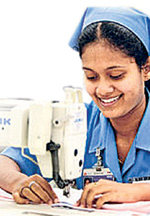|
Regaining GSP+:
Great leap for apparel exports
by Sanjeevi Jayasuriya
The apparel sector which is expected to leap with the anticipated
regaining of the GSP+ facility will be the main driver of the ambitious
export target set to be achieved by 2020.
 “We are confident that exports will reach new heights through an
increase in apparel exports and the benefit would trickle down to
sectoral workers by way of increased wages and clearing the backlog of
EPF and other dues,” Prime Minister Ranil Wickremesinghe told garment
exporters at Temple Trees last week. “We are confident that exports will reach new heights through an
increase in apparel exports and the benefit would trickle down to
sectoral workers by way of increased wages and clearing the backlog of
EPF and other dues,” Prime Minister Ranil Wickremesinghe told garment
exporters at Temple Trees last week.
Policy Planning Deputy Minister Dr. Harsha de Silva was also
present.While stressing the need to maintain a vibrant apparel sector,
he said that new thinking and technological infusion should be the way
forward for maintaining productivity and high standards.
“Our garments are world-class. We need to maintain the momentum and
implement sustainable measures to ensure we meet the demand and
deadlines all the time. It is imperative that the country streamlines
its policy framework in the apparel sector to ensure an efficient
industry, the Prime Minister said.
The restoration of the GSP + facility will help open a number of
garment factories which were closed down due to the suspension of GSP +.
It will also lead to an increase in the salaries of employees in the
sector, he said.
“The condition for the exporters to enjoy the benefits of GSP+ is
that they have to pay the EPF and ETF of the employees properly. The
exporters will also have to increase the salaries of apparel sector
employees. There should be a real increase in their salaries,” Dr.
Harsha de Silva said.
He added that the European Union has not laid any fresh conditions
for the restoration of this facility.
“There are no new commitments that bind us. It is the agreement that
we signed that there is fair play, equity and justice in the country,”
he said.
Dr. de Silva said the social market policy that the government is
speaking of has focused more on employees, their dignity, salaries and
job satisfaction.
He said the European Union will lift the fish import ban from Sri
Lanka soon and this decision will help boost the fisheries sector too.
He said the government wanted to create an economy which is more
competitive in this part of the world to have a competitive market.
“We are obviously unable to compete with Bangladesh at the low end of
the market. Our objective is to create a highly competitive market. We
are targeting highly competitive goods and services,” Dr. de Silva said.
He added that the country will have to start producing highly
competitive goods and services.
“We want to infuse new technology and new innovations, new ways of
doing businesses. We are not worried about the business we lost to
Bangladesh and Vietnam due to wage differences.
The government wants to attract new investments and new types of
businesses,” he said. |

